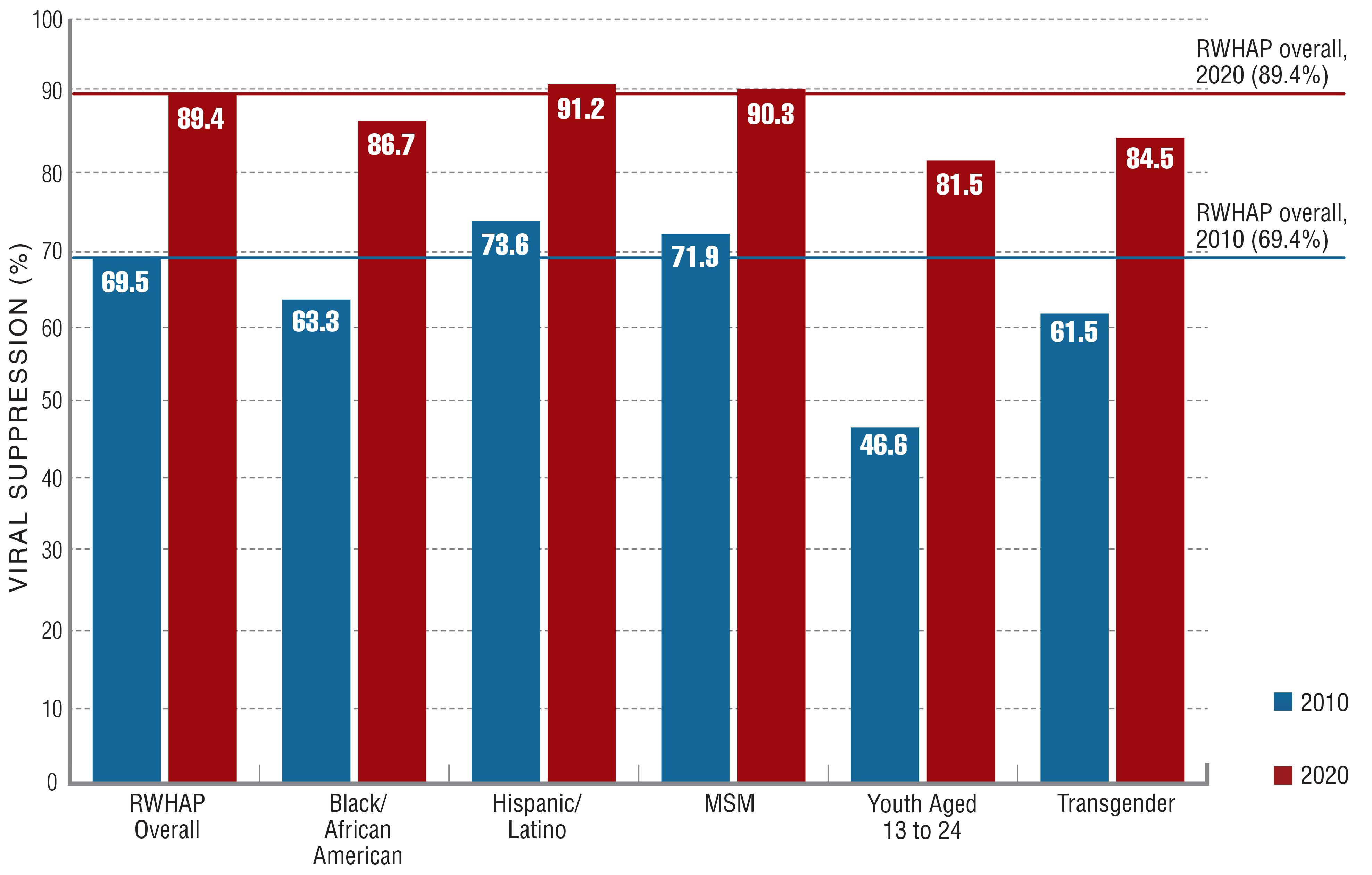2021
Improving HIV Health Outcomes with Innovative Initiatives to Reduce Health Disparities and Address Stigma
Advancing health equity has long been a guiding principle of the Ryan White HIV/AIDS Program (RWHAP). The coronavirus disease 2019 (COVID-19) pandemic highlighted the impact health and social inequities can have on patients and providers. In 2021, during the pandemic, the RWHAP supported recipients in providing high-quality, culturally responsive care and treatment services–through virtual and in-person appointments–for people with HIV. At the same time, the RWHAP implemented innovative approaches to improve health equity, stop HIV stigma, and reduce health disparities among racial and ethnic minorities and in geographic regions most affected by the HIV epidemic. Through the dedication and commitment of RWHAP recipients in providing vital services to their clients, tremendous progress has been made over the last decade toward improving health outcomes, such as viral suppression rates among RWHAP client priority populations and reducing HIV disparities, as shown in the chart below.
Viral Suppression Among Selected RWHAP Priority Populations

With the 2021 launch of the interactive Ryan White HIV/AIDS Program Compass Dashboard, RWHAP recipients, partners, and others can access data showing the reach, impact, and outcomes of the RWHAP, including viral suppression. The dashboard provides national-, state-, and metropolitan area–level data and allows users to explore RWHAP client characteristics and outcomes, such as age, housing status, transmission category, and viral suppression level.
Focused RWHAP Efforts to Address Health Disparities/Health Inequities and HIV Stigma
In 2021, the RWHAP launched or advanced programs, initiatives, and best practices with a continued focus on improving health equity and addressing HIV stigma. The following initiatives focus on community engagement, capacity building, leadership training, evidence-informed interventions, and gender-affirming care.
Engage Leadership through Employment, Validation, and Advancing Transformation and Equity (ELEVATE) for persons with HIV: ELEVATE is a capacity-building program for people with HIV to become involved in planning, improving, and delivering RWHAP services. ELEVATE is specifically addressing the workforce recruitment, development, and advancement needs of people with HIV aged 50 years and older, young Black men, people of transgender and gender-diverse experience, Hispanic/Latino individuals, and people experiencing recovery. The program aims to engage more than 600 participants in workshops and webinars to support people with HIV through three engagement opportunities: leadership training, strength-based coaching, and web-based resources.
Ending Stigma through Collaboration and Lifting All to Empowerment (ESCALATE): ESCALATE is an innovative training and capacity-building initiative specifically designed to address HIV-related stigma that creates barriers at multiple levels of the HIV care continuum. ESCALATE trains and empowers participants to recognize and address HIV stigma across the RWHAP with a particular focus on reducing stigma toward people of transgender and gender-diverse experience and men who have sex with men (MSM), as well as among Black/African American, Latinx, and American Indian/Alaska Native communities. The program is available to all recipients in RWHAP Parts A, B, C, and D, including community-based organizations, Federally Qualified Health Centers, health departments, planning councils, and planning bodies.
Using Evidence-Informed Interventions to Improve Health Outcomes Among People Living with HIV (E2i): E2i is an RWHAP Part F Special Projects of National Significance initiative that supports the implementation of evidence-informed interventions to reduce HIV-related health disparities and improve outcomes for people with HIV, including retention in care, treatment adherence, and viral suppression. The evidence-informed interventions cut across five focus areas, including improving HIV health outcomes for transgender women, improving HIV health outcomes for Black MSM, integrating behavioral health with primary medical care for people with HIV, identifying and addressing trauma among people with HIV, and building capacity among the community-based programs funded through the program.
Best Practices Compilation: This new information-sharing tool facilitates the dissemination of intervention strategies that have been implemented in RWHAP-funded settings to improve outcomes along the HIV care continuum. RWHAP recipients and subrecipients can use the tool to learn about and adopt innovative models of care that have been successfully implemented by others. The searchable tool allows recipients and subrecipients to search for interventions by evidence category; population; HIV care continuum stage, such as viral suppression; setting; funding Part; and Ending the HIV Epidemic in the U.S. pillar. Currently, the Best Practices Compilation focuses on Emerging Interventions, which have shown real-world impact, but do not yet have published research evidence.
Gender-Affirming Care: The RWHAP has been supporting the delivery of affirming, whole-person health care and services to people of transgender experience with HIV to reduce health disparities and stigma and improve HIV related outcomes. A recent RWHAP program letter emphasizes the importance of providing gender-affirming care and services to people of transgender and gender-diverse experience across various RWHAP core medical and support service categories, as outlined in Policy Clarification Notice #16-02 Ryan White HIV/AIDS Program Services: Eligible Individuals & Allowable Uses of Funds. Examples of care and services include hormone therapy, behavioral and mental health services, housing, case management, and substance use disorder treatment services.
HRSA’s RWHAP will continue to work with recipients to explore new opportunities and approaches to address and eliminate disparities and stigma, improve health outcomes, and help to end the HIV epidemic in the U.S.
 Health Resources & Services Administration
Health Resources & Services Administration

